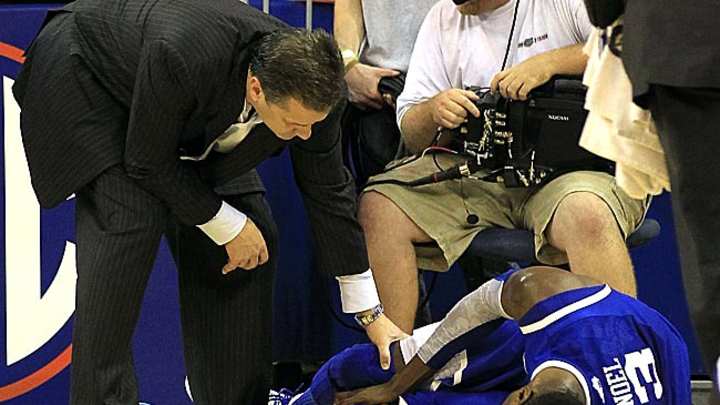Noel's injury shouldn't raise age limit concerns

The sight of Kentucky freshman Nerlens Noel screaming in pain on the floor Tuesday night sent shivers down the spines of anyone who saw it. An 18-year old kid who loved to play, done for the season with an ACL that snapped while he was hustling back on defense to stop a layup.
Wrapped in the storylines that have spider webbed off of Noel's injury is the question of whether Noel should have been playing at Kentucky in the first place. Ten years ago, a player like Noel may have made bypassed college, taking his talents from Tilton (N.H.) High School straight to the NBA. The league eliminated that option for amateurs in 2005, when it collectively bargained in an age limit that states, effectively, that a player must be 19 to be draft eligible. Noel's injury has brought the critics of the rule back out of woodwork, arguing that while Noel may still have gotten hurt in the NBA, but at least he would have the safety net of a guaranteed paycheck.
Is that true? Absolutely. Noel would have been a lottery pick last year if he came out of high school. His defense guaranteed that.
Should the NBA abolish its age minimum's? Absolutely not.
I like the age limit, and not because it enhances the college game which, as we have seen this season, is as poorly played as ever. It's because it weeds out the mistakes.
Let me throw some names at you:
Korleone Young.
Taj McDavid.
Leon Smith.
Remember them? Don't worry, most don't. Young was a blue chip prospect in Virginia who entered the 1998 draft. He was drafted in the second round, played three games with Detroit and never played in the NBA again. The New York Times called McDavid, a South Carolina high school star, "the embodiment of the failed draft dream" when he was passed over by every team in the 1996 draft. Smith was taken in the first round by the Spurs in '99. He battled psychological problems and played in just 15 games in two seasons
McDavid, Young and Smith are just a few casualties of the post-Kevin Garnett NBA. The success of Garnett, Kobe Bryant and LeBron James opened the flood gates for starry eyed high schoolers to jump straight to the NBA. The rule wasn't created for Garnett, James and Bryant, just like it isn't for Noel, UCLA's Shabazz Muhammad or UNLV's Anthony Bennett. They are getting the short end of the straw, no doubt about it. It was created to keep as many McDavid's and the Young's out of the NBA by taking the option away from the general managers who are drafting them.
Is it fair? Not really. But it should be noted that the rule doesn't force players to go to college. They can play in the D-League. Sure the D-League only pays around $30,000. But a high profile prospect could pick up millions more in a sneaker deal. There are always more lucrative opportunities overseas. Brandon Jennings did it. Worked pretty well for him.
No one is saying the NBA is looking out for high school players. Come on: The age minimum is as self serving as it gets. The league wants to use college basketball as a farm system and allow scouts to get better looks at players competing against high level competition. The NBA isn't interested in education, doesn't care about making the NCAA better.
But it doesn't mean it's wrong.
This is a difficult argument to win, because you can't prove a negative. We don't know if there is a player out there who instead of foolishly entering the draft early, went to college, polished his game and went on to become a better pro than he would have if he entered the draft after his senior prom. We don't know if there was a flashy prep player who went to college, realized he didn't have it and got to enjoy a four-year experience. The argument would be enhanced exponentially if we did.
But those stories are out there, they have to be. The one-and-done rule isn't perfect. Far from it. There is a case to be made that the NBA should actually raise the age limit, to make it more like college football, which requires players to be three years removed from high school. Three years. The NFL doesn't take much heat for that rule. Remember when Robert Griffin III tore his ACL in his sophomore season at Baylor? Where was the blowback from that?
Noel's situation is a tough one, but it shouldn't be a referendum on a rule that makes sense on a lot of levels. It protects the NBA, sure, but a lot of times it protects players from themselves.

Chris Mannix is a senior writer at Sports Illustrated covering the NBA and boxing beats. He joined the SI staff in 2003 following his graduation from Boston College. Mannix is the host of SI's "Open Floor" podcast and serves as a ringside analyst and reporter for DAZN Boxing. He is also a frequent contributor to NBC Sports Boston as an NBA analyst. A nominee for National Sportswriter of the Year in 2022, Mannix has won writing awards from the Boxing Writers Association of America and the Pro Basketball Writers Association, and is a longtime member of both organizations.
Follow sichrismannix